Centre for Ethno -Veterinary Practice & Alternative Medicine
The centre has been established with its mandate to derive information on ethnoveterinary practices, their scientific validation and development of a protocol for their use in Veterinary and Animal Science to support health and production as well as to make livestock rearing lucrative and convenient for the better livelihood of farmers. There are immense opportunities for the development of the drugs based on the ethnobotanical leads and these drugs can be used for the effective animal health care at an affordable cost for the benefit of farmers of State. In addition, the development of ethnoveterinary practices would also provide income generation to resource-poor and marginal farmers. Over and above all, there is an urgent need for the amalgamation of the modem veterinary medicine and the ethnoveterinary practices to derive synergy in the animal health care and to bring health care within reach of farmers by making it economically viable and convenient.
As such very little of this traditional knowledge has been documented in the country and this ethnoveterinary knowledge has had no place in mainstream veterinary medicine, despite the fact that, it offers great potential to develop and provide a low-cost alternative to allopathic medicines. The centre is working in the direction of documentation of this knowledge, its scientific validation, development of protocols and formulations as well as their transformation is ready to use a form for use of these ethnoveterinary medicines as well as practices as therapeutic, prophylactic or as a supplement by clinicians and or livestock owners. An MOU with Ayurved University, Jodhpur has also been done to work together particularly in the field of “Panchgavya.”
Name of Officer Incharge:- Dr. Ashok Gaur
Contact No.:- 941439188
Email:- drapsinghbikaner@yahoo.co.in
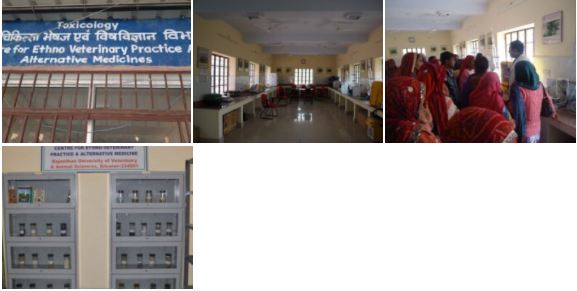
Livestock Feed Resources Management and Technology Centre
The Centre is working with a mandate to assess and develop feed resource availability for animals by identification and exploring the new feed resources, conservation and preservation of feed and fodder and optimum utilization of feed resources by using appropriate feed technology applied
outside as well as inside animal system to ensure optimum nutrition to farm animals for production.
Formulation of feeding strategies and development of new feed technologies for arriving at balanced adequate nutrition to animals around the year to sustain and improve the productivity of farm animals of State to support animal husbandry led the growth of Rajasthan.
Name of Officer Incharge:- Dr. Dinesh Jain
Contact No.:- 8003300472
Email:- ddineshvet@gmail.com
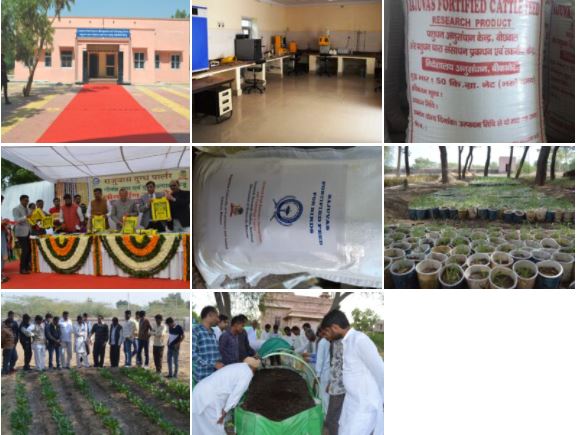
Veterinary University Training and Research Centre (VUTRC) in each District
The Centres are started in a phased manner with the mandate to impart service of training to the farmers on new technologies of animal husbandry and veterinary science. These centres are also providing farm advisory services, identification and solution of local animal husbandry problems, development and refining of package of practices suitable to the local conditions, provision of diagnosis and health care as
well as analysis of feed and fodder and animal products to sustain and improve animal productivity as well as animal production systems for better livelihood of farmers. These centres are innovative and different from training centres on account of imparting of around and skill oriented trainings with the approach of “learning by doing” and “teaching by doing”. Assessment of training needs and gaps
between available technology and its application in the field is prerequisite and it will be taken care by centres to get a measurable improvement in livestock production systems.
Establishment of Post -Graduate Institute in Veterinary Education and Research at Jaipur (PGI-VER)
The Institute has been established with the mandate to generate highly qualified human resource in the field of veterinary and animal science facing the extreme dearth of qualified manpower all across the country. This centre will act as the national referral centre for veterinary type cultures, disease diagnosis, biological, immunodiagnostics, impart continuing education to field veterinarians, take up advance research as well as to develop and refine technologies in all areas of veterinary and animal science. The post graduation (M.V.Sc.) programme has been started at the institute to develop human resource in veterinary and animal science disciplines with the skills and knowledge necessary to meet the challenges of the new millennium.
Engineering and Technology Centre for Animal Science
The Centre is working with its mandate to carry research and design technologies as well as
machinery for value addition of livestock products and to improve animal husbandry operation status. The centre is mainly engaged to design new machines and technologies according to the need and requirement of farmers to improve the efficiency of animal husbandry practices for which centre is entrusted to undertake basic and applied research in the area of livestock sector covering production, processing, economics and management.
Name of Officer Incharge:- Dr. Ashok Dangi
Contact No.:- 9413684464
Email:- drashokdangi@gmail.com
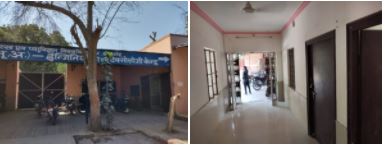
Centre for Conservation of Animal Biodiversity
The Centre is working with the mandate to document, conserve and propagate animal biodiversity, in the State of Rajasthan considered being rich in animal biodiversity. The state of Rajasthan in enriched by the animal biodiversity of the country but it is under threat so much so that some of the precious indigenous breeds are endangered. The Government is trying to conserve this, that is why University has planned to start this centre. The centre aspires to become a focal point for conservation and environmental activities throughout the State.
Name of Officer Incharge:- Dr. Mohan Lal
Contact No.:- 9414603842
Email:- drmlgodara00@gmail.com
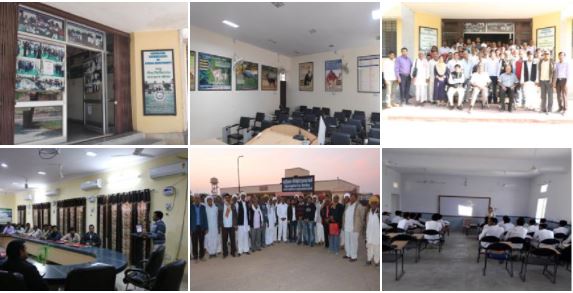
Centre for Organic Animal Production Technology
The Centre is working with the mandate to develop a knowledge centre to impart, disseminate and promote organic animal husbandry in the state and to encourage and carry out research in identified areas for promotion of organic livestock production and processing. In recent years organic farming is emerging and The state demand for organic products is high. Due to very less work on organic animal product technology, Rajasthan State having natural organic animal products such as milk, meat, wool etc. are not getting proper market value. This centre is thus entrusted to work on latest technologies in this field and promote organic livestock production and processing.
Name of Officer Incharge:- Dr. Vijay Kumar
Contact No.:- 9828122277
Email:- drvijaybishnoi29@gmail.com
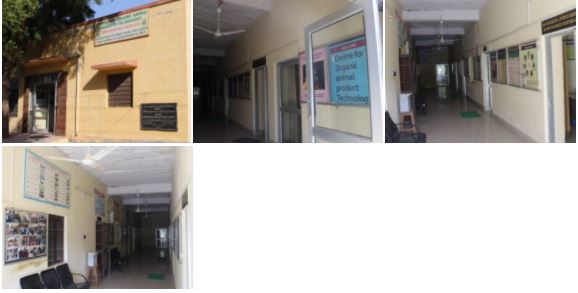
Centre of Excellence for use of Space Based Technology in Animal Science
The Centre is working with the mandate to develop and make use of space-based technologies in the improvement of livestock sector for improved management and production. A new era of the space based- technology in animal science will produce cost-effective solutions and innovative technologies to The state current needs. As such, climate change and environmental disasters are coming up as a big threat to state and national economies. Monitoring environmental changes and analyzing real-time data for further climate change model is crucially important in understanding climate change in respect with animal science. The centre is working in the direction of the centre of excellence in this niche area.
Name of Officer Incharge:- Dr. N S Rathore
Contact No.:- 9799607070
Email:- spacebased.sp12@gmail.com
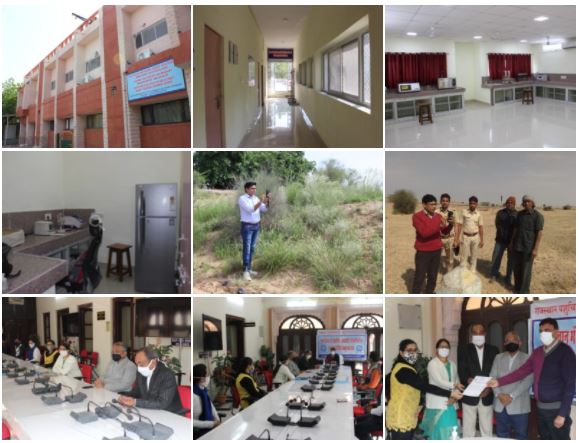
Centre for Disaster Management Technology for Animals
The Centre is working with the mandate to design and develop mechanism as well as strategies for protection of animals on occurrence of the disaster in the State. The centre will conduct studies and research, organize workshop and training programmes, publish its reports and documents provides various policy advisory services to the State. The strategies to deal with animals in the critical situations of disaster need to be developed and implemented and as such not much attention has been given to this sector in animal science. The University has come forward to minimize the risk of losses of animal wealth during the disaster.
Name of Officer Incharge:- Dr. Praveen Bishnoi
Contact No.:- 9414594944
Email:- drpbishnoi29@gmail.com

Centre for Studies on Wild Life Management and Health
The Centre is working with the mandate to provide health management consultancy to free and captive wildlife to facilitate their conservation and better health management.
• Health monitoring and disease surveillance in free and captive wildlife.
• Development of feeding standards for captive animals.
• Application of molecular markers in wildlife conservation.
• PG teaching related to wildlife health management.
The overall objective of the programme is to produce well trained and skilled manpower understanding the dynamics of wildlife population and ecosystem health in general. Based on this specialized training the manpower should be able to manage wildlife resources in a healthy and sustainable way enhancing productivity of ecosystems for the present and future programmes.
Name of Officer Incharge:- Dr. Sarkar Palecha
Contact No.:- 9460002249
Email:- sakarpalecha@outlook.com
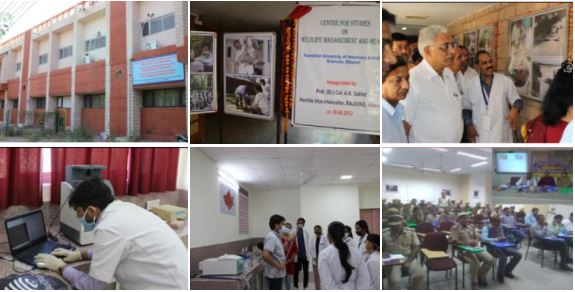
Animal Bio-Medical Waste Disposal Technology Centre
The Centre has been established with the mandate to test and develop different methods of animal biomedical waste disposal to improve the status of health and to prevent hazards. Different types of waste generated in the clinical veterinary practice are considered regulated veterinary medical waste, such as discarded needles, syringes, vaccines, vials that contained certain live and attenuated vaccines, cultures, stocks of infectious agents, other clinical waste etc. The disposal of these need based knowledge and skill at every level to prevent hazards to human and livestock population. The centre is entrusted to develop and disseminate economic and effective technologies and strategies in this regard.
Name of Officer Incharge:- Dr. Deepika Goklaney
Contact No.:- 9413684447
Email:- abmwdtcrajuvas@gmail.com
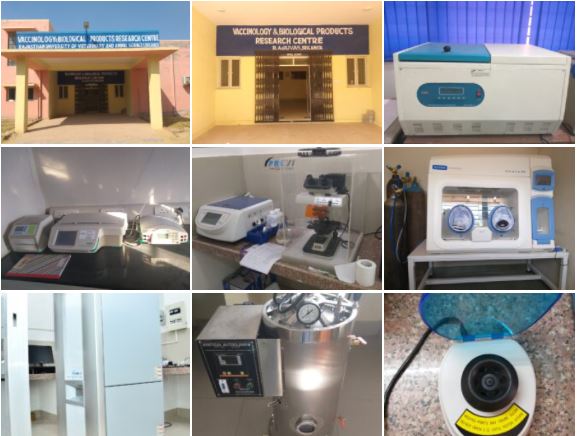
Vaccinology and Biological Product Research Centre
Maintenance and updating of bacterial type cultures for Veterinary Biologicals as well as evaluation of good manufacturing practices and training of personnel engaged in the production of Veterinary Biologicals. The divisional activities are directed towards the large-scale production of different immunobiologicals, organization of training programmes for the state biological production units through national diploma and specialized short-term training courses, besides rendering advisory services. In addition, scientists are also engaged in conducting research towards the improvement of the existing immunobiologicals and the newer products.
Name of Officer Incharge:- Dr. B. N. Sringi
Contact No.:- 9571894341
Email:- brij_shringi_2005@yahoo.com

Rain Water Harvesting Model Of RAJUVAS
Rain Water Harvesting Model of RAJUVAS
Necessity:– Bikaner has an annual rainfall of around 250 mm which falls short of requirements.
The main campus of RAJUVAS is spread over 63000 Sqm. of the area. The annual rainwater availability in the campus is expected to be around 95.00 lac litres. RAJUVAS was thinking of utilizing rainfall to enhance its green cover. Efforts were initiated very humbly to divert flowing water on its roads to green beds by the side of roads. After the establishment of the University, a plan was prepared to harvest rainwater from the roofs of buildings, roads, water coming in the campus from outside and even rainwater collecting around its boundaries.
The layout of the rainwater harvesting system:
Type 1: Harvesting rainwater from buildings:– To collect rainwater 5 RCC underground water tanks with total capacity of 9.5 lac litres have been constructed at different locations in the RAJUVAS campus. Out of these, 3 tanks are of 2.5 lac real-time capacity each and 2 tanks with 1.0 lac litres each capacity, totalling to 9.5 lac litres. Surface and rooftop rainwater is collected in these tanks through pipe and chamber system. Collected water, after filtration, is stored in these tanks and overflow/surplus water is carried to the existing open dry well located within the campus and in two newly constructed soakage wells. It is expected that around 68.00 lac litres of rainwater per annum shall be there for underground recharging. Simultaneously, RAJUVAS shall be able to utilize around 30 lac litres of water for drinking and other purposes. A complete system, including RCC underground tanks, chambers and pipeline system, filters and soakage wells have been constructed. The system is ready for a collection of surface rainwater and rooftop rainwater from existing buildings. The system is constructed is such a way that roof top water from any other building can also be carried to the main system. At present 5 building is connected to the main system in the first phase. Remaining buildings of the campus will be connected in the second phase very shortly. The schematic diagram showing a complete rainwater harvesting system of RAJUVAS campus is enclosed for kind perusal.
Type 2: Harvesting of road surface rainwater:– For this purpose, Toe walls along the sides of roads were built providing around a metered space between the road and the wall. This space was covered by cement blocks fixed on the sand. The road, as well as blocks, provided ample slope to allow water to collect along the toe wall. Since cement blocks have been fixed over sand, space between blocks (1-2 mm) allowed water to percolate into the sand. Toe wail v/as punctured at appropriate places and GI pipes fitted in the hole across the toe wall. Excess water along the walls was allowed through these pipes to the greenery bed providing sufficient water to plants and excess to be percolated into the earth. The schematic diagram showing this type of water harvesting is enclosed for kind perusal.
Type 3: Harvesting of rainwater accumulated at road junction outside boundary wall of RAJUVAS:– The boundary on the corner of hostel premises at Chaudhary Bhimsen Circle used to have around half a meter deep accumulation of rainwater. This accumulated water used to disrupt the traffic at this busy square and leading to damage to NH 11. RAJUVAS thought it proper to harvest this rainwater into our own land across the boundary wall. At three places, Hume pipes of 6” diameter was placed across the wall. Land near the boundary was dressed in a way that its level remains more than 1 feet lower than the roadside level. This allowed water to flow into our campus and absorbed by the soil. Now we have planned to develop a green belt at this point so that plants get many times more water. The schematic diagram showing this type of water harvesting is enclosed for kind perusal.
NEWS & UPDATES View All
- राजस्थान प्री-वेटरनरी टेस्ट-2025 की तैयारियों के लिए बैठक का आयोजन
- डेयरी विज्ञान एवं प्रौद्योगिकी महाविद्यालय के छात्रों का शैक्षणिक भ्रमण
- विश्व जूनोसिस दिवस के अवसर पर 22 श्वानों का हुआ रेबीज रोधी टीकाकरण
- विश्व जूनोसिस दिवस पर आयोजित हुई विभिन्न प्रतियोगिताएं
- प्रो. आर.एस. पाल पंतनगर में हुए सम्मानित
- वेटरनरी क्लिनिकस में भामाशाहों ने किए पंखे भेंट
- वेटरनरी विश्वविद्यालय सुरक्षित सड़क मार्ग अभियान के तहत विद्यार्थियों हेतु जागरूकता कार्यक्रम
- वेटरनरी विश्वविद्यालय कतरियासर में जल संरक्षण जागरूकता कार्यक्रम का आयोजन
- वेटरनरी विश्वविद्यालय नवआगन्तुक विद्यार्थियों की हुई फ्रेशर पार्टी
- वेटरनरी विश्वविद्यालय ने मनाया 11वां अन्तर्राष्ट्रीय योग दिवस
- वेटरनरी विश्वविद्यालय शैलेन्द्र देवड़ा ने ग्रहण किया कुलसचिव पद का अतिरिक्त प्रभार
- शैलेन्द्र देवड़ा ने ग्रहण किया कुलसचिव पद का अतिरिक्त प्रभार
- प्रो. शिव कुमार शर्मा को कुलसचिव पद का अतिरिक्त कार्यभार
- एनसीसी यूनिट द्वारा कैडेट्स को प्रदान किये सी सर्टिफिकेट
- वेटरनरी विश्वविद्यालय में मनाया विश्व पर्यावरण दिवस
- डेयरी विज्ञान एवं प्रौद्योगिकी महाविद्यालय ने मनाया विश्व पर्यावरण दिवस
- पारम्परिक बेलगाड़ी की संरचना के तकनीकी सुधार पर मिला पेटेंट
- राजुवास का इंजीनियरिंग एंड टेक्नोलॉजी ने विकसित किया 3डी प्रिंटेड मॉडल
- गांव गढ़ियाला (कोलायत) में जागरूकता शिविर का आयोजन
- वेटरनरी विश्वविद्यालय में मनाया विश्व दुग्ध दिवस
- OPEN TENDER FOR Light Decoration at CVAS, Bikaner
- OPEN TENDER FOR Garbage collection at CVAS, Bikaner
- OPEN TENDER FOR Supply of General Items at CVAS, Bikaner
- OPEN TENDER FOR Supply of Electric Items at CVAS, Bikaner
- OPEN TENDER FOR Sale of Milk at LRS Kodemdesar
- OPEN TENDER FOR supply multi functional laser printers at CVAS Bikaner
- OPEN TENDER FOR Electrical Items at CVAS Navania
- OPEN TENDER FOR Inverter Split air conditioner (hot and cold) at CVAS, Bikaner
- Rate Contract for Supply of Veterinary Medicine items at RAJUVAS, Bikaner
- Limited tender for agricultural land at LRS Nohar
- Open tender for supply of Air Conditioners at CVAS Bikaner
- Open tender for supply of Water Coolers at CVAS Bikaner
- OPEN TENDER FOR ALL IN ONE PCs at CVAS Bikaner
- OPEN TENDER FOR VETERINARY MEDCINE AND CONSUMABLES at CVAS Navania
- Open tender for shared farming at KVK Nohar
- Tender for supply of Green Grass at LRS Bikaner
- Tender for publication of Pashupalan Naye Aayam
- Tender for Grass Planting at Bikaner campus
- Tender for Supply & Installation Scanner
- office order Regarding Cancelation of Imported item tender Rate Contract
- Rate approved order copy for Water Cooler at CVAS Bikaner
- Rate approved order copy for Scanner at COE Office
- Rate approved order copy for JCB Machine at CVAS Bikaner
- office order Regarding Cancelation of Imported item tender Rate Contract
- Officer order Regarding Cancelation of Stationary Items Rate Contract
- Financial Bid opening for Flat Interactive Panel
- Rate contract for supply of fodder for Kharif crop at RAJUVAS, Bikaner
- Rate approval order of Feed supplement at CFMMP, RAJUVAS
- Rate approval order of Mineral Salts for mineral mixture at CFMMP, RAJUVAS
- Rate approved order copy for generator set at CVAS, Bikaner
- Approved rate for Generator set at CVAS, Bikaner
- Work order for Feed Ingredient at RAJUVAS, Bikaner
- Work order for Feed Ingredient at RAJUVAS, Bikaner
- Rate contract order
- Rate contract order
- Rate contract order
- Rate contract order
- Rate Approved order for General Items at CVAS, Bikaner
- Last date extension NIT UTM
- Construction of Gate and Balance work of Boundary wall

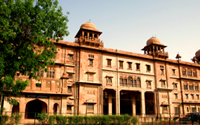
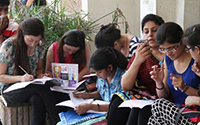

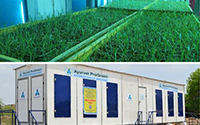
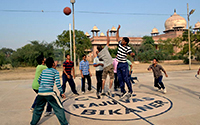





Follow Us!